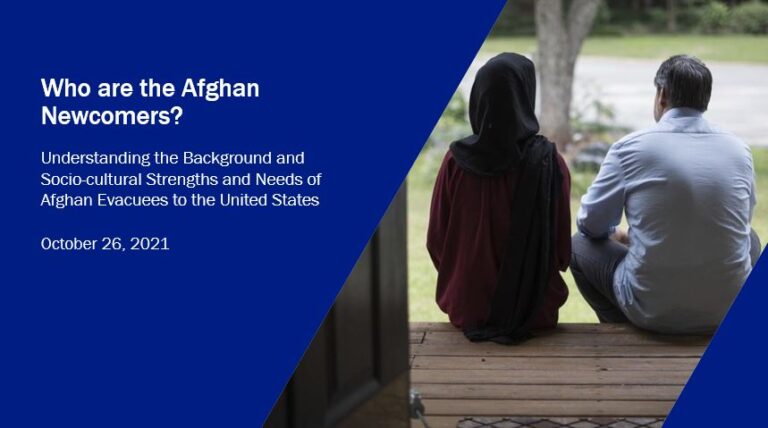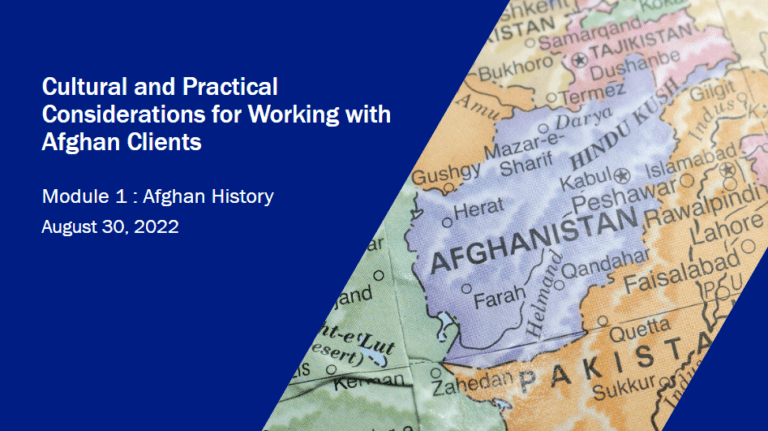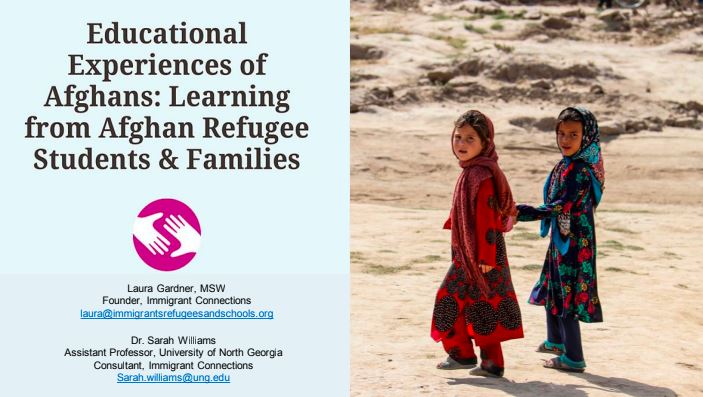Many refugee service providers are asking how to best support clients from Afghanistan during this time of crisis. Below are a few tips that may be helpful to program staff and leaders as they seek to care for clients and staff affected by the situation in Afghanistan.
Sharing Information Compassionately
The current situation in Afghanistan is uncertain and dynamic. People will naturally ask questions for which staff do not have answers, or for which there is no answer. If staff do not have the answer to a question, or if there is no information available, compassionately acknowledge this reality. A helpful response might be: “I wish I had the answer you need. Unfortunately, I don’t at this time. I can point you to [external source] where official, up-to-date information is posted. I know this is not the information you need right now, and I am sorry.”
People may have a wide range of reactions to not receiving information they desperately need. Use Psychological First Aid (PFA) skills to support people patiently and non-judgmentally; and no matter how they react, remember that their reaction is not personal. PFA is an evidence-informed approach to help stabilize and mitigate psychological distress and facilitate coping and functioning in the immediate aftermath of a disaster or other tragic event. The basic tenets of PFA also have wide applicability in situations where someone may be distressed and overwhelmed. To learn more, stream the Switchboard webinar Psychological First Aid (PFA) during COVID-19 Response.
Consider putting together a list of reliable resources with up-to-date information in Dari and Pashto that can be shared with clients. See here for a list of relevant resources compiled by Switchboard. To decrease the burden on all staff, your organization may want to appoint a focal point to gather and disseminate the most up-to-date information on the situation.
Crisis Planning
In times of great distress, it is common to see increased incidence of suicidal ideation, self-harm, and mental health concerns. Revisit your organization’s crisis response protocol to make sure that you have a plan in place for what to do during a client mental health crisis. This plan may be internal, meaning that you have trained staff able to do assessment and safety planning, or it may be external, meaning that this will be done by another provider. All staff should be familiar with the crisis response plan and know how to implement it. Here are some Switchboard materials you may find useful:
- Information Guide – Trauma-Informed Care: Preventing Crises and De-escalating Difficult Situations
- Information Guide – Fundamentals of Gender-Based Violence (GBV) for Refugee Service Providers: The What, Why, and How of Safety Planning. While this guide focuses on GBV, content related to safety planning may be relevant to clients in other situations.
Mental Health Support and Referrals
Responding with distress to a crisis is normal and does not necessarily mean someone needs specialized mental health support. A good rule of thumb before referring is Intensity, Frequency, and Duration. How intense are the symptoms (dangerous, impairing functioning, threatening safety, etc.)? How often are they happening? For how long are they happening? The more intense, frequent, and long-lasting the symptoms are, the more likely that support may be needed.
If providing a referral, make sure you have vetted the external provider to ensure the referral is appropriate. Do not simply give a number to call. Instead, provide a warm hand-off. The below resources from Switchboard go into more detail on mental health support and referrals:
- Information Guide – Building a Culturally Informed Network of Refugee Mental Healthcare Providers
- Information Guide – A Trauma-Informed Understanding of Mental Health and Psychosocial Support (MHPSS)
Be cautious of creating emotional support groups for clients from Afghanistan right now. Without a highly trained facilitator and clear objectives, asking people to process the situation as a group may inadvertently increase distress. Offering information to a group or making a venue available for a community-led group may be more productive approaches than actively leading programs in which people are asked to process their distress.
Staff Care and Self-Care
If you are a manager or supervisor, you can play an important role during this time. Given that there may be more clients in distress, you may want to increase your open office hours and supervisory support. With your organization’s leadership, explore what other supports can be made available to staff. Switchboard’s information guide Preventing Occupational Hazards by Promoting Organizational Resilience summarizes strategies that supervisors and organizations can use to support wellbeing among their staff. One simple strategy is the Resilience ABC’s:
- Awareness – Encourage staff to monitor their own well-being. What do they need to look for to signal they are feeling overwhelmed?
- Balance – Have staff reflect on what they usually do to help restore themselves when they are feeling depleted. Ask them what help they need to do this more.
- Connection – Remind staff that connection is one of the primary ways to foster resilience. Who do they find connection with? Who can they contact if they want support or to process emotions?
Give additional attention to staff of Afghan origin to ensure they have the emotional bandwidth to engage in this work at this time. They may be called upon to provide additional services, such as interpretation, that increase workloads and exacerbate an already distressing situation. If they are unable to take on these tasks, work with leadership to look at other avenues, such as telephonic or remote interpretation.
Like staff care, self-care is essential during times of crisis. Switchboard’s recent blog post Does Self-care Really Matter to My Health or Identity? offers a range of self-care suggestions. Together with organizational supports, these strategies can help maintain personal resilience during this difficult time.









